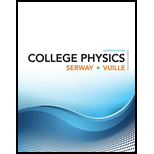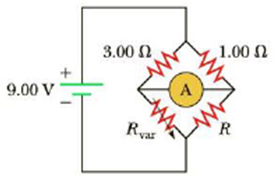
College Physics
11th Edition
ISBN: 9781305952300
Author: Raymond A. Serway, Chris Vuille
Publisher: Cengage Learning
expand_more
expand_more
format_list_bulleted
Textbook Question
Chapter 18, Problem 19P
Figure P18.19 shows a Wheatstone bridge, a circuit used to precisely measure an unknown resistance R by varying Rvar until the ammeter reads zero current and the bridge is said to be “balanced.” If the bridge is balanced with Rvar = 9.00 Ω, find (a) the value of the unknown resistance Rand (b) the current in the 1.00 Ω resistor. (Hint: With the bridge balanced, the wire through the ammeter can effectively be removed from the circuit, leaving two pairs of resistors in parallel.)

Figure Pl8.19
Expert Solution & Answer
Trending nowThis is a popular solution!

Students have asked these similar questions
Make sure to draw a Free Body Diagram as well
Make sure to draw a Free Body Diagram as well
Make sure to draw a Free Body Diagram please as well
Chapter 18 Solutions
College Physics
Ch. 18.1 - True or False: While discharging, the terminal...Ch. 18.1 - Why does a battery get warm while in use?Ch. 18.2 - In Figure 18.5, the current is measured with the...Ch. 18.2 - The circuit in Figure 18.5 consists of two...Ch. 18.3 - In Figure 18.8, the current is measured with the...Ch. 18.3 - When the switch is open in Figure 18.8, power Po...Ch. 18.3 - Suppose you have three identical lightbulbs, some...Ch. 18.3 - If the lightbulbs in Quick Quiz 18.7 are connected...Ch. 18.5 - The switch is closed in Figure 18.20. After a long...Ch. 18 - Choose the words that make each statement correct....
Ch. 18 - Given three lightbulbs and a battery, sketch as...Ch. 18 - Suppose the energy transferred to a dead battery...Ch. 18 - A short circuit is a circuit containing a path of...Ch. 18 - Electric current I enters a node with three...Ch. 18 - If electrical power is transmitted over long...Ch. 18 - The following statements are related to household...Ch. 18 - Two sets of Christmas lights are available. For...Ch. 18 - Why is it possible for a bird to sit on a...Ch. 18 - An uncharged series RC circuit is to be connected...Ch. 18 - Suppose a parachutist lands on a high-voltage wire...Ch. 18 - A ski resort consists of a few chairlifts and...Ch. 18 - Embodied in Kirchhoffs rules are two conservation...Ch. 18 - Why is it dangerous to turn on a light when you...Ch. 18 - A battery haring an emf of 9.00 V delivers 117 mA...Ch. 18 - Prob. 2PCh. 18 - A battery with an emf of 12.0 V has a terminal...Ch. 18 - A battery with a 0.100- internal resistance...Ch. 18 - Two resistors, R1 and R2 are connected in series....Ch. 18 - Three 9.0- resistors are connected in series with...Ch. 18 - (a) Find the equivalent resistance between points...Ch. 18 - Consider the combination of resistors shown in...Ch. 18 - Prob. 9PCh. 18 - Consider the circuit shown in Figure P18.10. (a)...Ch. 18 - Consider the circuit shown in Figure P18.11. Find...Ch. 18 - Four resistors are connected to a battery as shown...Ch. 18 - The resistance between terminals a and b in Figure...Ch. 18 - A battery with = 6.00 V and no internal...Ch. 18 - Find the current in the 12- resistor in Figure...Ch. 18 - (a) Is it possible to reduce the circuit shown in...Ch. 18 - (a) You need a 45- resistor, but the stockroom has...Ch. 18 - (a) Find the current in each resistor of Figure...Ch. 18 - Figure P18.19 shows a Wheatstone bridge, a circuit...Ch. 18 - For the circuit shown in Figure P18.20, calculate...Ch. 18 - Taking R = 1.00 k and = 250 V in Figure P18.21,...Ch. 18 - In the circuit of Figure P18.22, the current I1 is...Ch. 18 - In the circuit of Figure P18.23, determine (a) the...Ch. 18 - Four resistors are connected to a battery with a...Ch. 18 - Using Kirchhoffs rules (a) find the current in...Ch. 18 - Figure P18.26 shows a voltage divider, a circuit...Ch. 18 - (a) Can the circuit shown in Figure P18.27 be...Ch. 18 - A dead battery is charged by connecting it to the...Ch. 18 - (a) Can the circuit shown in Figure P18.29 be...Ch. 18 - For the circuit shown in Figure P18.30, use...Ch. 18 - Find the potential difference across each resistor...Ch. 18 - Show that = RC has units of time.Ch. 18 - Consider the series RC circuit shown in Figure...Ch. 18 - An uncharged capacitor and a resistor are...Ch. 18 - Consider a series RC circuit as in Figure P18.35...Ch. 18 - The RC charging circuit in a camera flash unit has...Ch. 18 - Figure P18.37 shows a simplified model of a...Ch. 18 - The capacitor in Figure P18.35 is uncharged for t ...Ch. 18 - What minimum number of 75-W light bulbs must be...Ch. 18 - A 1 150-W toaster and an 825-W microwave oven are...Ch. 18 - Prob. 41PCh. 18 - Prob. 42PCh. 18 - Assume a length of axon membrane of about 0.10 m...Ch. 18 - Consider the model of the axon as a capacitor from...Ch. 18 - Prob. 45PCh. 18 - How many different resistance values can be...Ch. 18 - (a) Calculate the potential difference between...Ch. 18 - For the circuit shown in Figure P18.48, the...Ch. 18 - Figure P18.49 shows separate series and parallel...Ch. 18 - Three 60.0-W, 120-V lightbulbs are connected...Ch. 18 - When two unknown resistors are connected in series...Ch. 18 - The circuit in Figure P18.52a consists of three...Ch. 18 - A circuit consists of three identical lamps, each...Ch. 18 - The resistance between points a and b in Figure...Ch. 18 - The circuit in Figure P18.55 has been connected...Ch. 18 - Prob. 56APCh. 18 - The student engineer of a campus radio station...Ch. 18 - The resistor R in Figure P18.58 dissipates 20 W of...Ch. 18 - A voltage V is applied to a series configuration...Ch. 18 - For the network in Figure P18.60, show that the...Ch. 18 - A battery with an internal resistance of 10.0 ...Ch. 18 - The circuit in Figure P18.62 contains two...Ch. 18 - An electric eel generates electric currents...Ch. 18 - In Figure P18.64, R1 = 0.100 , R2 = 1.00 , and R3...Ch. 18 - What are the expected readings of the ammeter and...Ch. 18 - Consider the two arrangements of batteries and...Ch. 18 - The given pair of capacitors in Figure P18.67 is...Ch. 18 - 2.00-nF capacitor with an initial charge of 5.10 C...
Knowledge Booster
Learn more about
Need a deep-dive on the concept behind this application? Look no further. Learn more about this topic, physics and related others by exploring similar questions and additional content below.Similar questions
- please answer this asap!!!!arrow_forwardRT = 4.7E-30 18V IT = 2.3E-3A+ 12 38Ω ли 56Ω ли r5 27Ω ли r3 28Ω r4 > 75Ω r6 600 0.343V 75.8A Now figure out how much current in going through the r4 resistor. |4 = unit And then use that current to find the voltage drop across the r resistor. V4 = unitarrow_forward7 Find the volume inside the cone z² = x²+y², above the (x, y) plane, and between the spheres x²+y²+z² = 1 and x² + y²+z² = 4. Hint: use spherical polar coordinates.arrow_forward
- ганм Two long, straight wires are oriented perpendicular to the page, as shown in the figure(Figure 1). The current in one wire is I₁ = 3.0 A, pointing into the page, and the current in the other wire is 12 4.0 A, pointing out of the page. = Find the magnitude and direction of the net magnetic field at point P. Express your answer using two significant figures. VO ΜΕ ΑΣΦ ? Figure P 5.0 cm 5.0 cm ₁ = 3.0 A 12 = 4.0 A B: μΤ You have already submitted this answer. Enter a new answer. No credit lost. Try again. Submit Previous Answers Request Answer 1 of 1 Part B X Express your answer using two significant figures. ΜΕ ΑΣΦ 0 = 0 ? below the dashed line to the right P You have already submitted this answer. Enter a new answer. No credit lost. Try again.arrow_forwardAn infinitely long conducting cylindrical rod with a positive charge λ per unit length is surrounded by a conducting cylindrical shell (which is also infinitely long) with a charge per unit length of −2λ and radius r1, as shown in the figure. What is σinner, the surface charge density (charge per unit area) on the inner surface of the conducting shell? What is σouter, the surface charge density on the outside of the conducting shell? (Recall from the problem statement that the conducting shell has a total charge per unit length given by −2λ.)arrow_forwardA small conducting spherical shell with inner radius aa and outer radius b is concentric with a larger conducting spherical shell with inner radius c and outer radius d (Figure 1). The inner shell has total charge +2q, and the outer shell has charge −2q. What's the total charge on the inner surface of the small shell? What's the total charge on the outer surface of the small shell? What's the total charge on the inner surface of the large shell? What's the total charge on the outer surface of the large shell?arrow_forward
arrow_back_ios
SEE MORE QUESTIONS
arrow_forward_ios
Recommended textbooks for you
 College PhysicsPhysicsISBN:9781285737027Author:Raymond A. Serway, Chris VuillePublisher:Cengage Learning
College PhysicsPhysicsISBN:9781285737027Author:Raymond A. Serway, Chris VuillePublisher:Cengage Learning Physics for Scientists and Engineers: Foundations...PhysicsISBN:9781133939146Author:Katz, Debora M.Publisher:Cengage Learning
Physics for Scientists and Engineers: Foundations...PhysicsISBN:9781133939146Author:Katz, Debora M.Publisher:Cengage Learning College PhysicsPhysicsISBN:9781305952300Author:Raymond A. Serway, Chris VuillePublisher:Cengage Learning
College PhysicsPhysicsISBN:9781305952300Author:Raymond A. Serway, Chris VuillePublisher:Cengage Learning Principles of Physics: A Calculus-Based TextPhysicsISBN:9781133104261Author:Raymond A. Serway, John W. JewettPublisher:Cengage Learning
Principles of Physics: A Calculus-Based TextPhysicsISBN:9781133104261Author:Raymond A. Serway, John W. JewettPublisher:Cengage Learning
 College PhysicsPhysicsISBN:9781938168000Author:Paul Peter Urone, Roger HinrichsPublisher:OpenStax College
College PhysicsPhysicsISBN:9781938168000Author:Paul Peter Urone, Roger HinrichsPublisher:OpenStax College

College Physics
Physics
ISBN:9781285737027
Author:Raymond A. Serway, Chris Vuille
Publisher:Cengage Learning

Physics for Scientists and Engineers: Foundations...
Physics
ISBN:9781133939146
Author:Katz, Debora M.
Publisher:Cengage Learning

College Physics
Physics
ISBN:9781305952300
Author:Raymond A. Serway, Chris Vuille
Publisher:Cengage Learning

Principles of Physics: A Calculus-Based Text
Physics
ISBN:9781133104261
Author:Raymond A. Serway, John W. Jewett
Publisher:Cengage Learning


College Physics
Physics
ISBN:9781938168000
Author:Paul Peter Urone, Roger Hinrichs
Publisher:OpenStax College
How To Solve Any Resistors In Series and Parallel Combination Circuit Problems in Physics; Author: The Organic Chemistry Tutor;https://www.youtube.com/watch?v=eFlJy0cPbsY;License: Standard YouTube License, CC-BY